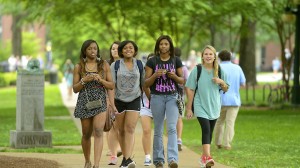OXFORD, Miss. – In an effort to promote education and understanding across cultures while supporting traditionally underrepresented students, the University of Mississippi will open the Center for Inclusion and Cross-Cultural Engagement this fall.
Beginning in the fall of 2012, a faculty and staff-advised committee of student leaders, called the Multicultural Center Working Group, gathered information from UM students through surveys, interviews and focus groups to determine the need for more resources to improve diversity and inclusion.
The group’s findings were that underrepresented groups of students perceived inequities in the availability of resources in regards to their race, sexual orientation, religious affiliation, gender and other differences. A recommendation was made to develop a multicultural center that would provide a quality learning experience for all members of the university community.
“It was profound how much the students cared about making a case for this center,” says Norris “EJ” Edney, coordinator of Greek affairs and co-chair of the working group. “There was no doubt that they felt they owed it to their future alma mater to leave a legacy that would provide broader access to full membership in the Ole Miss family.”
The center, which will temporarily be located in Stewart Hall and later moved to the renovated Ole Miss Student Union, will provide programs and services that encourage cross-cultural interactions while serving as a “safe space” that is both welcoming and nurturing to all students.
Establishing the center supports the University Creed, says Brandi Hephner LaBanc, vice chancellor for student affairs.
“Students are at the core of what we do,” LaBanc said. “For prospective students, it indicates that inclusion is a priority at UM and we will help them develop their identity and voice here. For current students, it signals that we listened to their wants and needs, and they were critical in developing a more inclusive community.”
“A 21st century Ole Miss experience should embrace the diversity of cultures and identities we have on campus and actively welcome them into our community,” said William Fowler, a senior in integrated marketing communications and president of Phi Delta Theta fraternity.
After an incident involving the university’s James Meredith statue this spring, Fowler, who is also a member of the Associated Student Body Inclusion committee, recalls three students groups – ASB, the Black Student Union and One Mississippi – working together to help ease cultural tension on campus.
“There are plenty of students and student groups who are already addressing these issues, but there could be more communication between groups,” Fowler said.
Briana O’Neil, BSU president, agrees that the center will improve student interaction.
“Hopefully this will build respect in the university students, faculty, and staff and teach us that no member of this community is more important than another,” O’Neil said.
“In orientation, we tell incoming students that the University of Mississippi is a place with boundless diversity, one where they can experience a global society, and a place where everyone speaks,” said Valeria Ross, associate dean of students. “The center will be one of the major venues on our campus that will facilitate cross-cultural dialogue and intercultural communication for our community.”
The center’s new director, Shawnboda Mead, is excited to see the university take such a positive step toward cultivating an environment where individual differences are valued. A graduate of Mississippi State and Western Kentucky University, Mead has served more than nine years in higher education, with her previous role as the associate director of diversity and multicultural education at the University of Tennessee.
“My desire is to expand the concept of diversity and inclusion within the university community,” Mead said. “As director, I welcome the opportunity to proactively address the challenges that students of color, LGBTQ students and other underrepresented populations face on campus.”
Chancellor Dan Jones said he hopes the center will encourage and support engagement across cultures to build a stronger community.
“For some, the center will offer opportunities to meet and know people from backgrounds different than their own,” Jones said. “That may be differences in geography, race, religious thought, or political leanings. The more we spend time with people, the more we understand each other.”
